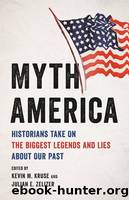Myth America: Historians Take on the Biggest Legends and Lies About Our Past by Kruse Kevin M

Author:Kruse, Kevin M. [Kruse, Kevin M.]
Language: eng
Format: epub
Tags: History, Politics, Adult
ISBN: 9781541601390
Amazon: 1541601394
Goodreads: 60383035
Publisher: Basic Books
Published: 2022-10-18T07:00:00+00:00
14
White Backlash
Lawrence B. Glickman
On September 27, 1966, CBS Reports aired a documentary called Black PowerâWhite Backlash. The documentary began with chants of âBlack Powerâ followed by Mike Wallaceâs somber narration: âSummer 1966 was a season of revelation for the white man in the North. For the first time, he began fully to comprehend the intensity of his feelings and his fears about the black man.â Throughout the documentary, Wallace didnât simply foreground white fears and anxieties; he claimed that âBlack power was the catalystâ of those fears, comparing white backlash to a chemical reaction. White people had become âfed up with racial turmoil,â he claimed, and, as a result, were now âcountermarching, counterdemonstratingâ in opposition to Black Power.1
Contrary to Wallaceâs narrative, summer 1966 was far from âthe first timeâ that white people acted on their âfears and anxietiesâ about the Black struggle for freedom and equality. Indeed, just a few days after the documentary was broadcast, Martin Nolan of the Boston Globe observed that the ââwhite backlashâ is now 3½ years old.â And less than a month later, the syndicated columnists Rowland Evans and Robert Novak claimed that âthe backlash is becoming a permanent feature of the political scene,â noting a lingering âbitter anti-Negro resentment.â Yet the Black PowerâWhite Backlash documentary reversed that history. Even the ordering of the words in its titleâlike much journalistic and scholarly writing about opposition to the civil rights movementâimplied that the âwhite backlashâ was a response to âBlack Power.â But the title got the history wrong. Whereas white backlash had been coined in 1963 to describe extant white resistance to emerging policy initiatives toward racial equality, Black Power was a brand-new phrase when the documentary aired in September 1966. The activist Stokely Carmichael, who appeared in the documentary, had brought the phrase to the public square in a speech only two months earlier.2
By the time the documentary aired, more than three years of polling data showed a trend of accelerating white backlash. Starting in May 1963, even before President John F. Kennedy promoted civil rights (his legislation having been stalled in Congress for several months), a Gallup poll asked a question every month about whether the Kennedy (and later the Lyndon B. Johnson) administration âis pushing racial integration too fast, or not fast enough.â For the next fifteen months, George Gallup reported that those who thought things were moving âtoo fastâ grew, with the ratio of person who said âtoo fastâ to ânot fast enoughâ increasing every month from two-to-one to four-to-one. By October 1963, 50 percent of Americans said JFK was going âtoo fast.â Headlines like âGallup: Too Fast,â and âIntegration Push Too Fast in Feeling of Those Surveyedâ appeared regularly.3
The reversal of agency on display in the documentaryâin which civil rights extremism caused white counterreactionâwas not an aberration but was actually typical of how white backlashes have long been explained and continue to be understood today. Commentators often misassign responsibility for backlashes, as Wallace did, by implying that African American activists are
Download
This site does not store any files on its server. We only index and link to content provided by other sites. Please contact the content providers to delete copyright contents if any and email us, we'll remove relevant links or contents immediately.
| Americas | African Americans |
| Civil War | Colonial Period |
| Immigrants | Revolution & Founding |
| State & Local |
In Cold Blood by Truman Capote(3375)
The Innovators: How a Group of Hackers, Geniuses, and Geeks Created the Digital Revolution by Walter Isaacson(3162)
Steve Jobs by Walter Isaacson(2889)
All the President's Men by Carl Bernstein & Bob Woodward(2369)
Lonely Planet New York City by Lonely Planet(2218)
And the Band Played On by Randy Shilts(2198)
The Room Where It Happened by John Bolton;(2152)
The Poisoner's Handbook by Deborah Blum(2135)
The Innovators by Walter Isaacson(2098)
The Murder of Marilyn Monroe by Jay Margolis(2095)
Lincoln by David Herbert Donald(1983)
A Colony in a Nation by Chris Hayes(1927)
Being George Washington by Beck Glenn(1923)
Under the Banner of Heaven: A Story of Violent Faith by Jon Krakauer(1789)
Amelia Earhart by Doris L. Rich(1691)
The Unsettlers by Mark Sundeen(1682)
Dirt by Bill Buford(1671)
Birdmen by Lawrence Goldstone(1662)
Zeitoun by Dave Eggers(1643)
